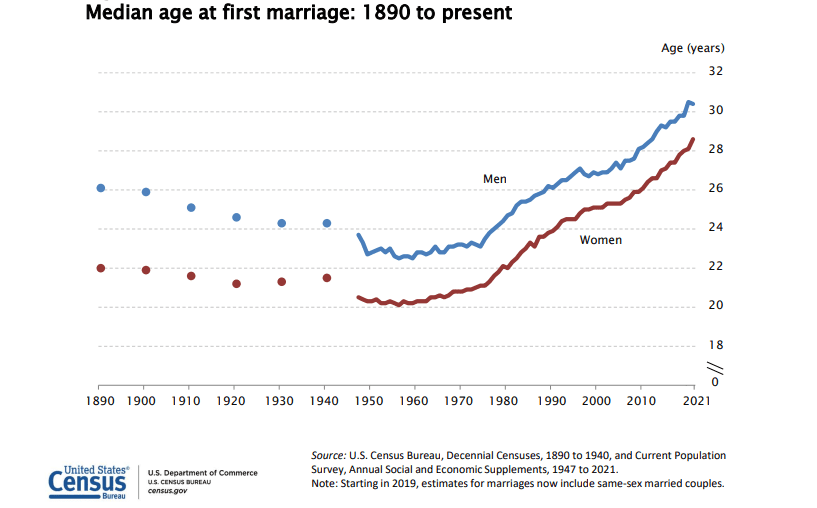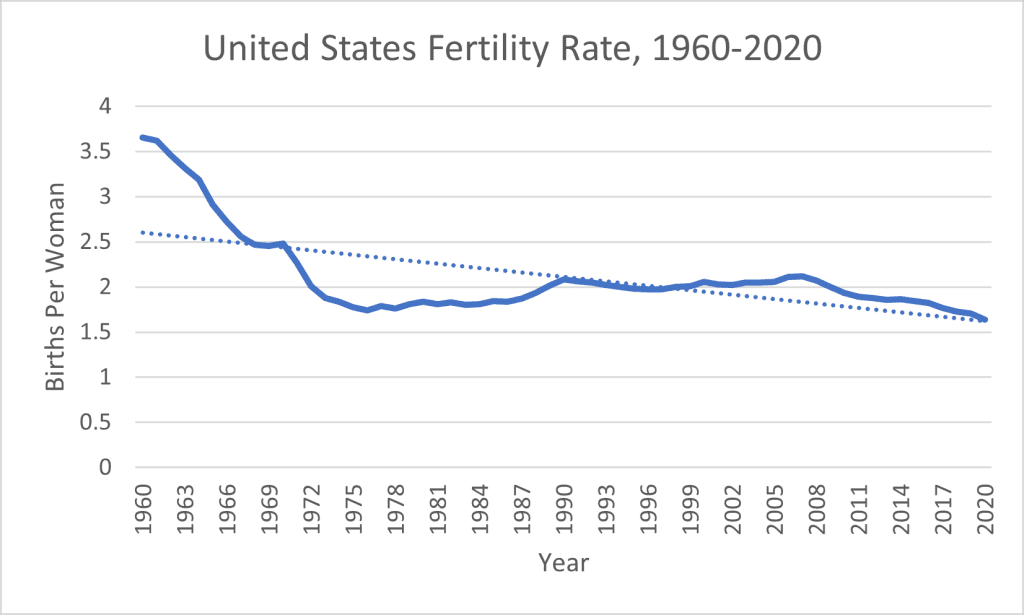 Today’s guest post is by Cara Hoekstra. Cara is a recent graduate of Baylor University, where she studied Sociology, History, and Political Science in the University Scholars program. Since graduating with her BA in 2021, she has participated in the Brazos Fellows program, a part-time residential fellowship studying theology and church history in community through Christ Church Waco. She has also continued working on various projects related to the intersection of marriage and the family and religion.
Today’s guest post is by Cara Hoekstra. Cara is a recent graduate of Baylor University, where she studied Sociology, History, and Political Science in the University Scholars program. Since graduating with her BA in 2021, she has participated in the Brazos Fellows program, a part-time residential fellowship studying theology and church history in community through Christ Church Waco. She has also continued working on various projects related to the intersection of marriage and the family and religion.
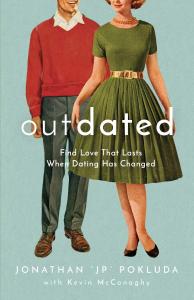 A new Christian dating book has been making its rounds at my alma mater. At a university where an “MRS.” degree is still frequently joked about, it isn’t surprising that such a book would be popular. Outdated: Find Love That Lasts When Dating Has Changed, published in 2021 by Baker Books, is the third book by Jonathan “JP” Pokluda, who is lead pastor of Harris Creek Baptist Church in Waco, TX. While Outdated provides helpful and important discussions of dating and marriage, it oversimplifies the process of dating and does not sufficiently account for the unique experiences of individuals and the social changes that have made dating what it is today.
A new Christian dating book has been making its rounds at my alma mater. At a university where an “MRS.” degree is still frequently joked about, it isn’t surprising that such a book would be popular. Outdated: Find Love That Lasts When Dating Has Changed, published in 2021 by Baker Books, is the third book by Jonathan “JP” Pokluda, who is lead pastor of Harris Creek Baptist Church in Waco, TX. While Outdated provides helpful and important discussions of dating and marriage, it oversimplifies the process of dating and does not sufficiently account for the unique experiences of individuals and the social changes that have made dating what it is today.
Outdated is the newest in a long line of Christian dating books attempting provide an alternative vision and social script to the one that modern dating culture has developed. Dating has changed significantly over the last centuries. Even the idea of dating itself is a modern concept. What was once a process of courtship in which the woman and her family had significant control has now become an independent and private practice. Christian dating approaches have attempted to reclaim the rules and family oversight of previous courting traditions. Books like Joshua Harris’s I Kissed Dating Goodbye, Elisabeth Elliot’s Passion and Purity, and Jackie Kendall and Debby Jones’s Lady in Waiting have fueled a culture of purity and courtship within the contemporary church.
Outdated is broken down into three sections: Why We Date, Who We Date, and How We Date. Each chapter is framed with a lie versus truth dichotomy. Pokluda attempts to dismantle what he considers a lie, which are often social or cultural dating tropes, and instead defends “the truth,” which is a reframing of biblical church teachings.
In his section on Why We Date, Pokluda covers the reasons people should date and how they should think about singleness. For him, dating is not about having fun or pleasure; the sole purpose of dating should be marriage. He also encourages singleness to be viewed as a gift rather than a problem to be fixed.
Part 2, Who We Date, challenges modern ideas such as following one’s heart or making physical attractiveness a priority. Rather, Pokluda encourages young people to first and foremost look for a godly spouse. He suggests young people think about the godliest single person of the opposite sex that they know and pursue that person. He even goes as far as to say that if both of you are following Jesus wholeheartedly, then the marriage is guaranteed to work out. In the chapter on compatibility and finding the perfect match, Pokluda discourages people from using dating apps. Rather than letting the algorithm decide, he would rather have people meet through serving together or church. The isolation that can come from online dating also doesn’t allow for advice or help from friends and family. While he does not say that online dating is a sin, he is skeptical and mourns its use.
The third and final section of the book deals with how we date. It covers topics such as playing games, premarital sex, cohabitation, break-ups, and how to know you’ve found the one you are going to marry. Much of this is familiar church teachings packaged in a simple and modern way. Like similar books before him, young adults are warned to not play games with others’ hearts but to be honest in their dating relationships. Along with that, he frequently cites biblical evidence to condemn premarital sex and cohabitation, which is in keeping with historic church teaching regarding chastity and abstinence before marriage. Supported by the idea that dating is for marriage, he tells young people to break up the moment they know they won’t or can’t marry the person they are dating. The final and shortest chapter of the book attempts to give a realistic but hopeful view of Christian marriage in which there will be hardships, but the goal is to glorify God.
The writing style and examples given in Outdated are well-suited to its audience of young adults. It is easy to read, uses everyday examples, and covers a variety of topics. However, a failure to give a good historical account of dating—and specifically Christian dating culture—leaves a large hole in the narrative.
The group of people to whom the book is targeted grew up in the 90s and early 2000s and have most likely been affected by what has become known as “purity culture.” What started as an evangelical movement in the 90s quickly grew into a Christian cultural movement promoting biblical purity with an emphasis on virginity, discouragement of dating, and outward tools such as purity pledges or purity rings. While there is no evidence that those who participated in these events and principles were different from their peers, there was a decline in teen sexual activity during these years, and teen pregnancy dropped significantly.
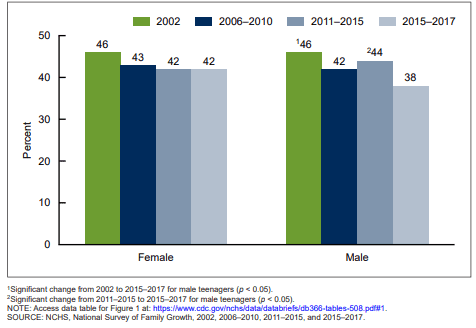
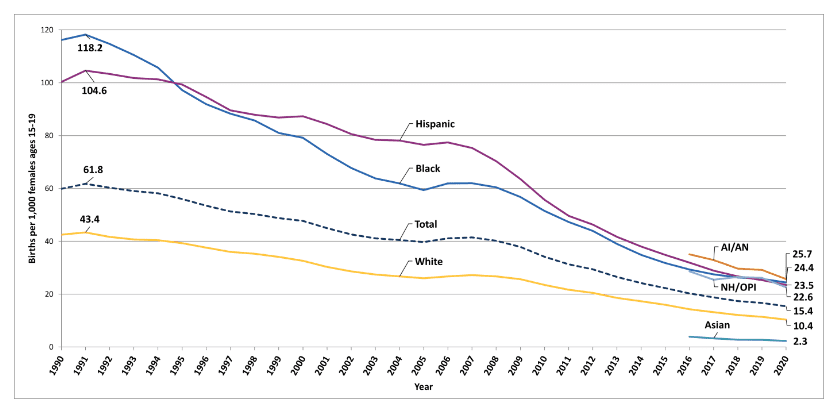
As others have pointed out, while purity culture placed responsibility on both sexes to uphold traditional gender roles and sexual mores, the majority of the pressure fell on young women and girls. This culture led to a lot of struggle with self-worth. Young women were told that if they remained pure and worked on their relationship with God, then God would reward them with a good husband. For many, it has led to naivety in the world, self-doubt, or an outright rebellion against purity culture ideals. These cultural phenomena have far-reaching implications for how its participants date and see the world. The failure to address Christian dating culture over the last 10 to 20 years is a blind spot within Pokluda’s book.
Pokluda also does not sufficiently deal with the changes that the 21st century has wrought upon dating culture. While dating itself only dates to the early 20th century with the introduction of the automobile, it has changed significantly since young people’s parents or even Pokluda himself have dated. His flippant and dismissive attitude regarding online dating will leave people feeling targeted and helpless. While he gives some theological reasoning for involving wise counsel in dating and how online dating can hinder this, his disdain appears to be largely due to personal prejudice.
Dating has changed in a way that makes it more difficult for Christian individuals. Mark Regnerus’s book The Future of Christian Marriage takes a sociological look at how Christians seek marriage in a culture that does not value it. Today’s marriage market is filled with challenges, especially in the church. On the ideological front, culture encourages short-term relationships or keeping one’s options open. Economically, a lack of good or stable jobs and the cost of marriage or a wedding deter many young people from marrying. With fewer people interested in marriage, the median age of first marriage has surged to 28.4 years old for women and 30.3 years old for men and fertility has diminished to 1.6, below replacement rate.
With these difficulties, people have sought to widen their dating pool through online dating. While traditional dating may be better for transparency and discerning with others in one’s community, it is not possible for some people. Pokluda does include advice for online dating, but it is simple and obvious—such as remembering that people lie and to beware of catfishing (fictional online personas)—rather than new or helpful advice. And he does not recognize the potential advantages that may come from online dating such as access to people beyond your social circles and clear intentions when meeting someone.
Outdated also fails to account for the sociological reality of the church today. Historically, the numbers have been skewed as women tend to be more religious, leading to more women than men in the church. While rates of religiosity have recently changed in younger generations, with men being more likely to identify with religion than young women, this has not yet translated into more men than women attending church. Within churches, women find themselves competing with other women for an increasingly small number of men. (For a more detailed description of the plight of single women in the church, check out this Anxious Bench post.)
In talking about whether women should make the first move, Pokluda recommends that they do not, reasoning that they would not want a passive husband and men wouldn’t want a controlling wife since these traits, according to him, are some of the most common causes of problems in marriage. Pokluda adds that a passive man would not be one to make decisions or willingly work on the relationship. He also compares women who take the initiative to ask men out to women in the Bible who were impatient and did not wait on God’s timing. This opinion is misguided and ignorant of history. Women have been taking the initiative in finding a spouse for hundreds of years. Before the invention of the automobile, women asked men first and men came calling to the woman’s house. The insistence on men making the first move also puts women in the church in a hard position. For some, it is a matter of making the first move or remaining single for the rest of their lives. There are fewer options for women, and such a principle limits the agency of women.
Finally, Outdated missed the opportunity to place marriage in a more historical and meaningful framework. Within the book, there was no reference to previous scholarship or church teaching on marriage. The church is full of scholarship, wisdom, and theology regarding marriage. From church fathers such as Augustine to modern writers such as C.S. Lewis or Pope John Paul II, there is a rich history from which to learn. While biblical evidence is important and necessary, a lack of commentary or evidence from other church sources misses the opportunity to explain more fully the importance and significance of a God-fearing marriage in ways that transcend our current culture. Interaction with works such as St. John Chrysostom’s On Marriage and Family Life, C.S. Lewis’s The Four Loves, or Karol Wojtyła’s (Pope John Paul II’s) Love and Responsibility, would place the significance of marriage within a deeper and broader perspective.
Outdated is clearly a book for a mainstream Christian young adult audience. Pokluda does a good job of addressing the major problems and questions Christians can face in dating. However, there are several pieces missing. The failure to talk about purity culture, provide more guidance for online dating, acknowledge the disadvantage of women in dating, and draw on previous Christian authors does his readers a disservice. Outdated is saying the same things similar Christian dating books before it have said. What young people need now is new perspectives or advice to help them navigate a quickly changing dating landscape.


